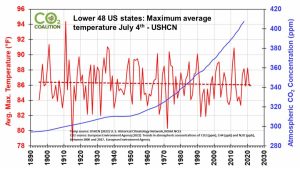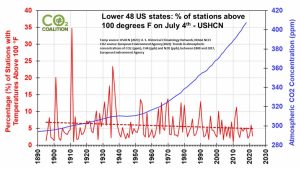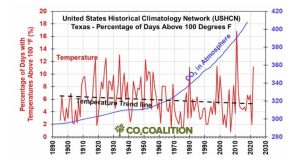Data Shows We’re NOT Seeing Record Heat
by Gregory Wrightstone
Hotter Than the Fourth of July!
It was widely reported recently that July 4th, 2023 was the hottest day in Earth’s recorded history.
Paulo Ceppi, a climate scientist at London’s Grantham Institute stated: “It hasn’t been this warm since at least 125,000 years ago, which was the previous interglacial.” And, of course, it was reported that it was our fault due to our “sins of emission.”
This didn’t meet the smell test for the scientists at the CO2 Coalition. We know that previous warm periods were warmer than our modern temperatures. For example, during the Roman Warm Period there was citrus being grown in the north of England and barley was grown by Vikings on Greenland 1,000 years ago. Why aren’t they grown there now? It’s quite simple: Lower modern temperatures.
So, here at the CO2 Coalition, we did what scientists are trained to do:
We looked at the available data. Our Science and Research Associate Byron Soepyan reviewed temperature data from the US Historical Climatology Network and found that both the number of weather stations reporting temperature over 100 degrees F and the Maximum Average Temperature for July 4th were slightly declining since the record began in 1895 – not increasing – as Ceppi claimed.


The Great Texas Heat Wave
It is summer. It is hot in Texas. It is not unusual or unprecedented. Below is a chart of the percentage of days in Texas that were above 100 degrees Fahrenheit since 1895. Despite a significant and steady rise in CO2 emissions, there has been a decline in the occurrence of very hot days.

Gregory Wrightstone is a geologist; executive director of the CO2 Coalition, Arlington, VA; and author of Inconvenient Facts: The Science That Al Gore Doesn’t Want You to Know.
